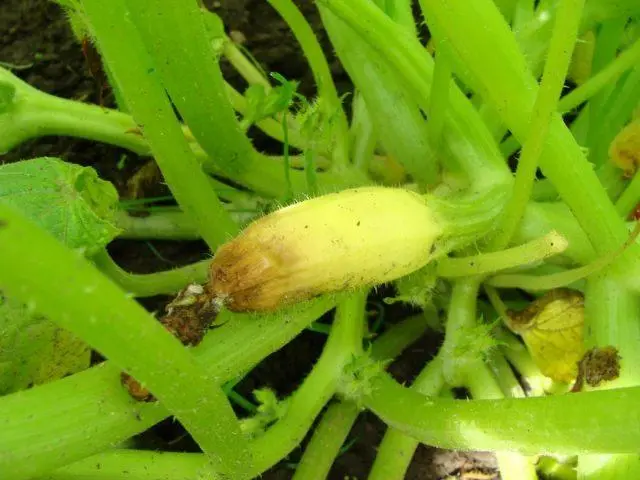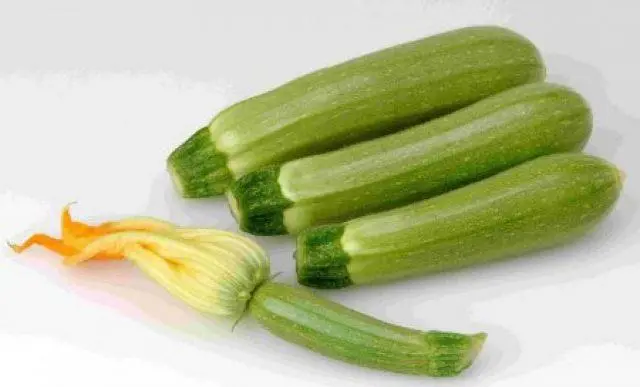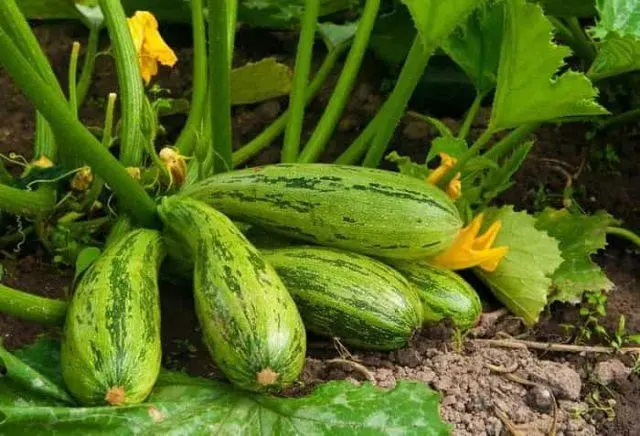Contents
Zucchini rot for a variety of reasons, but mostly they are associated with improper care. Due to dense planting and excessive watering, the leaves, ovaries, and then the fruits will begin to rot and may even die. For prevention, it is necessary to observe the norm of watering, regularly ventilate the greenhouse and inspect the plantings.
Why do the ovaries of zucchini rot in the open field
If inflorescences, fruits or leaves rot in zucchini, the reasons can be very different. When grown in open ground, the weather factor can affect – rainy and cool summer provokes decay, the spread of fungal infections. But often this phenomenon is associated with errors in care.
Weather
Due to unfavorable weather, the ovary, leaves, fruits, stalks of zucchini begin to rot. The culture is thermophilic, therefore it does not withstand long-term cool weather, especially in combination with temperature changes and high levels of humidity (rains, cloudy skies).
Because of the cold and dampness, zucchini weakens and can rot. Their immunity decreases, the ovaries are poorly formed, and the already formed ones fall off. Productivity is sharply reduced, since pollinators are much less in cloudy weather. It is difficult to influence this cause – it is necessary to grow a crop in a greenhouse or in a greenhouse under a film.
Deficiency or excess of trace elements
Zucchini can rot due to a violation of the feeding regimen. Rotting is especially often observed against the background of a lack of trace elements such as iodine and boron. In this case, the bushes rot and drop buds.
But too much food is bad. If the soil becomes saline, its pH changes. Therefore, the roots absorb new organic matter and water worse, the ovaries begin to rot and fall off.
It is especially dangerous to exceed the dosage of nitrogen fertilizers. Because of them, plants are rapidly gaining green mass, large leaves appear on the bushes. They prevent the access of light and air, which is why individual parts really begin to rot.

Rotting can be associated with a lack or excess of fertilizers.
Unsuitable site
So that the ovaries and other parts of the zucchini do not rot, you must carefully choose a landing site. It must meet several criteria at once:
- fully open (no shadow);
- without stagnant water (not in a lowland);
- with fertile, loose soil;
- protected from through wind, for example, by a fence or a greenhouse.
Planting density
One of the reasons why the ovaries of zucchini rot is due to the thickening of the plantings. Often summer residents, trying to save space, place seedlings too close to each other. As a result, many plants can be placed on the site, but they prevent the evaporation of moisture from the soil and the natural circulation of air. So that the zucchini does not rot, it is better to plant them in a checkerboard pattern with an interval of at least 60 cm.
Violation of crop rotation rules
Zucchini should not be planted on the same bed for three years in a row or more. It is dangerous to grow a crop after representatives of the same pumpkin family (squash, cucumbers). They share common diseases and pests that can also cause squash to rot.
The best predecessors are:
- beans;
- Vika;
- green pea;
- beans;
- lentils.
Overwatering
Like all cucurbits, zucchini loves water, but overwatering can cause them to rot and even die. Plants need regular, even watering. Water is given twice a week, making sure that the soil does not dry out, but at the same time is not too wet. To prevent the water from evaporating quickly, it is necessary to lay out a layer of mulch.
Another important point – you should exclude watering with cold water. Temperature fluctuations have a bad effect on the root system of the plant. It is also important to keep an eye on the weather forecast. Even if short rains are expected, additional water is not recommended.
Insufficient pollination
If zucchini from a flower rots in the garden, this may also be due to insufficient pollination. Especially often this phenomenon is observed in greenhouses, where access to insects is difficult. It is necessary to regularly keep the door open, plant flowers nearby to attract bees. On the other hand, self-pollinating hybrids can also be used, for example:
- Sangrum F1;
- Medusa F1;
- Cavili F1;
- Dry F1;
- Squash tree F1 and others.

Sukha F1 – one of the hybrids that do not need pollinators
Fungal diseases
A separate group of reasons why plants begin to rot is associated with fungal diseases. The culture is quite often affected by powdery mildew. This is an infection that manifests itself in such signs:
- Whitish “flour” coating on foliage, inflorescences, ovaries.
- White spots turn to red, then to black.
- Leaves, inflorescences and ovaries begin to rot. They are covered with black spots.
Another reason is top rot. It first affects the leaves, then spreads to the newly appeared ovaries. All affected parts of plants lose their normal shape, rot and begin to fall off.
However, this disease, unlike powdery mildew, is not infectious. It is associated with a lack of calcium. In order for the plants to stop rotting, they should be fed, for example, with calcium nitrate.
Why do small zucchini rot on a bush in a greenhouse
This phenomenon has its own characteristics – the main reasons are:
- Insufficient ventilation – the level of humidity is too high, the ovaries and fruits begin to rot.
- Lack of fertilizers, especially potassium and phosphorus.
- Lack of sunlight due to dense planting or greenhouse.
- Too much manure, humus and other organic matter in the soil – because of this, zucchini gain green mass and begin to rot.
- Over-watering combined with insufficient ventilation is another reason zucchini spoils.
- The problem with pollination is completely solved if you choose a self-pollinating variety.
What to do if the ovaries of zucchini rot
It is necessary to establish the cause of ovary rotting. If the plants look normal, with no signs of blossom end rot or powdery mildew, proceed as follows:
- completely stop watering for 5-7 days;
- carefully loosen the soil, remove weeds;
- remove all rotten parts;
- after the soil has dried, zucchini are fed with complex fertilizer, excluding nitrogen (it is better to give superphosphate 40 g per 10 l and potassium sulfate 30 g per 10 l).

If the soil is too wet, stop watering for a week.
If the ovaries of zucchini rot due to infection, plantings should be immediately treated with a fungicide:
- “Maksim”;
- “Tatu”;
- Fundazol;
- “Bordeaux liquid”;
- “Fitosporin”.
All diseased plantings are immediately removed and burned. It will no longer be possible to help them, and if left in the soil, healthy zucchini can infect.
How to prevent zucchini rot
To prevent rotting zucchini, it is recommended to follow the basic preventive measures:
- Water moderately, no more than twice a week, focusing on the weather forecast. Use only pre-settled water. So that the fruits, the ovaries do not begin to rot, water is poured exclusively under the root, avoiding contact with the leaves. It is better to work late in the evening.
- To prevent zucchini from rotting in the greenhouse, the room is regularly ventilated. If at night the street does not fall below +14, the greenhouse is left open around the clock.
- If the summer is rainy, be sure to remove the lower, old foliage. It interferes with the normal evaporation of the soil and leads to air stagnation.
- Remove all wilted buds in time, cut them off and burn them.
- Regularly inspect the bushes for signs of invasion, disease. If the zucchini began to rot, the affected plant is removed, and the rest are treated with a special preparation.
- When the fruits begin to form, place dry cardboard or a wooden board under them.
- If there is a cold summer in the region, it is better not to take risks and grow zucchini in a greenhouse, greenhouse.
Conclusion
Zucchini rot mainly due to improper care. Although often this phenomenon is observed in cold, cloudy weather. It is better to grow the crop in a greenhouse, while planting should be placed at a distance of 60-70 cm. During care, it is important not to give too much water, fertilize regularly, and, if necessary, remove the lower foliage.










